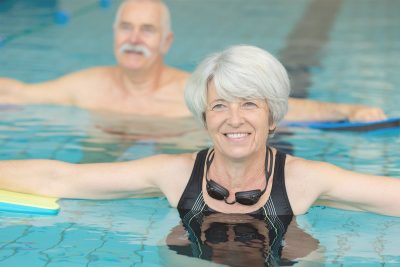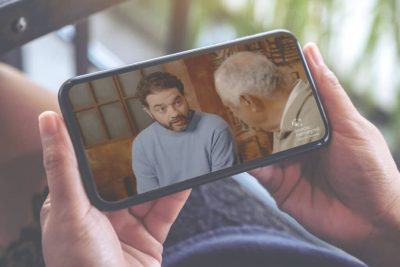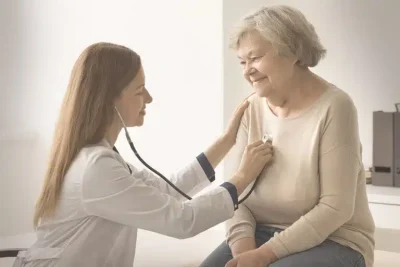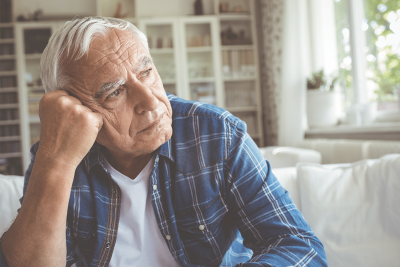Dan Goerke’s wife, Denise, was in her 50s when she first showed signs of Alzheimer’s disease. She would have trouble navigating to meetings and would work all night on a project, only for Dan to check and see that she was still trying to solve the same problem as the night before.
Denise’s primary care physician initially misdiagnosed the problem as a sleep disorder. And for a year, the couple struggled to live with Denise’s symptoms based on this diagnosis. After a recommendation from a friend, the couple ultimately went to a neurologist. The neurologist could tell during the first 10 minutes of the screening that something was wrong. When the diagnosis of Alzheimer’s was confirmed, it was a shock to Denise, to Dan, and even to the neurologist.
“It was a quiet car ride home,” Dan admitted. “But when we did get home, we talked about everything under the sun including, ‘What vacation do you want to take?’ and ‘What do you want to happen at your end of life ceremony?’ So, we made a list and she was very forthright, as she always was, about what she wanted to happen.”
But at the top of the list, Denise’s primary concern was to have information on next steps and find answers to her many questions. “The blunt answer was that the medical community didn’t support us,” Dan shared. “It was kind of a shocker to me because I knew as an Alzheimer’s caregiver that the brunt of the journey and the responsibilities going forward would be on me. But Denise, in her take-charge, move-forward fashion, grabbed a bunch of flyers that were sitting outside the doctor’s office and one of them was about an Alzheimer’s support group and a subsequent group at Emory. We enrolled in that program and it was a godsend. I also Googled Alzheimer’s and found the Alzheimer’s Association so I started getting involved with them.”
When Dan became involved with these groups, he was shocked again when he discovered that there were actually substantial resources available. “They’ll set up a care consultation and talk to you about next steps,” Dan explained. “They will talk about getting with an elder care attorney and taking care of your living will. They sit down with you to say, ‘Okay, consider these options now.’ I believe family members should talk to a care consultant about their situation and start getting involved in these types of Alzheimer’s support groups. I found the Alzheimer’s Association helpful to myself and my family. To this day, some of my closest friends are other care partners that I met through the support groups.”
New resources for Alzheimer’s care
It’s because of the disconnect between Alzheimer’s patients and caregivers, and the resources they need to move forward on their Alzheimer’s journey, that Georgia Memory Net was born. This organization exists to connect those in need with Alzheimer’s support groups such as the Alzheimer’s Association and the Rosalynn Carter Institute for Caregiving. Georgia Memory Net also plays a vital role in highlighting the importance of early patient screening and diagnosis for Alzheimer’s and other forms of dementia.
Dan firmly supports the value of early diagnoses and what it can mean for patients and their families. “Having lived in this world for 5+ years, I’ve seen so many people that quite frankly are like an ostrich and put their head in the sand and pretend Alzheimer’s is not happening. But the reality is that it’s no different than any other disease. It’s very, very important to get an early diagnosis so that you can start medications early to prolong the good part that you’re experiencing with your loved one. With more Alzheimer’s education, we might not have wasted a year on the wrong diagnosis.”
One of the best ways to get effectively screened for Alzheimer’s and some other forms of dementia is to visit your primary care physicians and ask for your Annual Wellness Visit. If you have an elderly parent or are concerned about memory or other behavioral issues that you’re seeing in a loved one, getting screened is essential to facing the future with this type of disease.
“Think about it,” said Dan. “If you’re clear-headed about what you’re facing, instead of saying, ‘I’m going to Tokyo for a vacation in five years,’ you’re going to get on a plane next week. You’re going to reprioritize your life, take care of your finances and make sure everything’s buttoned up for your family. An early diagnosis can greatly help you start making choices in your life. That’s why I think it’s so important to get an early diagnosis. And as an Alzheimer’s caregiver, you need that critical knowledge of how to care for someone you love.”
Moving ahead with Alzheimer’s care
“Denise is very much the type that she just keeps living her life as best and as normal as she could,” stated Dan. “She kept driving for a while, going shopping, going to the gym and water aerobics class. She just kept moving forward.” Robert still works with support groups, including the Alzheimer’s walk and other fundraising events. He now sits on the Board of Directors for an Alzheimer’s Association local chapter and he speaks regularly about his journey with Denise. Dan reassures people that help is available, but also added: “Just be real with yourself about where it’s going. I’m getting close to the end with Denise. I’m realistic about that, but also very grateful for the care consultants and my support groups, which have been a tremendous help. It’s been an amazing, an amazing journey in that regard.”




